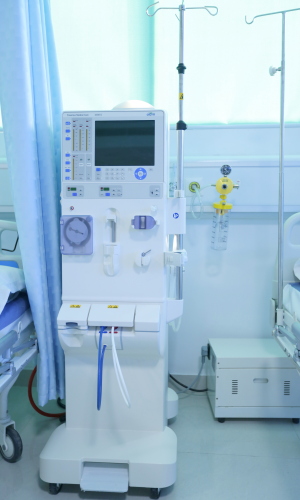
Dr. Jasbir Singh Ahluwalia MD (Medicine), DNB (Nephrology)
Make an appointment:
0172-4123456
Eden critical care hospital, the first 120 bedded superspeciality hospital of Tri-city providing you the wide range of services including the best dialysis center which is equipped with best dialysis machines.
The centre has highly experience qualified Nephrologists under whom the technologists and Para medics carry out the Haemodialysis.
In addition other services are provided by the department are:
Inpatient and critical care services:
Inpatient and critical care services are available and are managed 24 x 7 by highly proficient qualified team of nephrologists, skilled nursing and paramedical staff along with support of respiratory medicine, critical care specialists. Diet, medications like adipex, and fluid limits are often needed as well which are well taken care of by our skilled professionals.
if you have any of these following symptoms, please consult our kidney specialist:
(Frequently Asked Questions )
Dialysis eliminates waste products, extra salt water and toxins from the body which is normally done by our kidneys. If a person’s kidneys are no longer functional or able to eliminate these products dialysis is required to remove the toxins to avoid accumulation of harmful substances and waste products from our body. Dialysis replicates the function of kidneys in your body which are not able to function.
Dialysis is needed if your kidney function decreases to 15% or below.
Your doctor advises you when to start dialysis based upon your symptoms, lab test reports and the functioning of your kidneys. Kidney failure occurs when 90% filtering capacity of kidneys is lost.
As a result of inability of kidneys to clear the waste products from the body, these toxins keep on building up in the body. If it is left untreated it can lead to dangerous levels of toxin accumulation in our body, resulting in coma and death.
Common symptoms of kidney failure include :
Vomiting
Itchy skin
Swelling of hands, feet and ankle
Excessive fatigue
Dialysis is not a painful treatment. Only a few patients may experience a decrease in blood pressure, leading to sickness, vomiting or headache. With regular treatments, these problems will also go away
You may go back to your work after getting used to dialysis, but you may have to change your job if a lot of physical activity is involved at your job e.g. heavy labor, lifting, digging etc.
Most people need dialysis for a long term basis (mostly for the rest of their lives). You may opt for a kidney transplant if suitable for that. But if you are not suitable, long term dialysis is the only life saving option.
Life expectancy for those who start dialysis in their late 20’s is average 20 years. Some people may survive on dialysis for more than 30 years. Older adults above 75 years age have average life expectancy for around 4 years.
Dialysis is a life saving treatment for people who could have otherwise experienced life threatening problems, pain, disabilities, coma or even death.
You can normally read, write, listen music, watch tv or sleep.
Every person responds differently to dialysis treatment. You may feel perfectly normal & good after dialysis and resume your normal routine. Or you may feel a bit drained or “washed out” and require some rest after undergoing dialysis for the first time.
Most patients feel significant better after undergoing dialysis, which they haven’t felt since a long time.
If you don’t feel any improvement or feel any problem, you should inform your doctor and dialysis staff immediately.
Two types of dialysis are there : Haemodialysis & Peritoneal dialysis
Haemodialysis :
Most people are aware of this type of dialysis. A needle is inserted into your blood vessel, which is attached by a tube to the dialysis machine. Blood passes through the dialysis machine which filters out the waste products and clean blood free of toxins enters your body from the machine.
Sessions required: Most patients need 3 sessions a week, 4 hours each
Peritoneal dialysis :
It is a less known type of dialysis. It uses peritoneum i.e. the lining of abdomen as a filter. A small flexible tube called catheter is inserted into your peritoneum after giving an incision on the abdomen into the peritoneal cavity. Then a special fluid called dialysis fluid is pumped inside it, so as when blood moves through the peritoneum the waste products can get eliminated from blood into dialysis fluid and the the dialysis fluid is then drained out.
Sessions required: 30-40 minutes 4 times a day.
Both have similar results, but in some particular situations, one type of dialysis may be recommended.
Haemodialysis is for older adults with poor health condition. Peritoneal dialysis is for adults who are otherwise healthy but have a kidney disease.
Don’t eat a large meal, it may make you feel like vomiting. Have a light meal or snack, 2-3 hours before undergoing dialysis.
Eden Hospital managed by a team of highly qualified and experienced doctors and paramedical staff who have trained at premier institutes of the country
-Learn moreEden Hospital offers comprehensive medical services, request an appointment here.
-Learn moreEden critical care hospital has provided best Trauma center to the tri-city.
-Learn moreQuestions, issues or concerns? I'd love to help you!